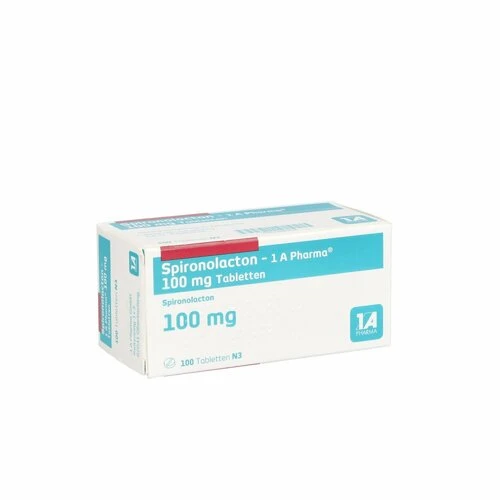This drug is a medicine that increases diuresis. This allows the medicine to flush out increased water accumulation in the tissues.
It applies to
primary hyperaldosteronism (a condition in which the secretion of the hormone aldosterone by an adrenal tumor is increased), unless surgery is indicated
Accumulation of fluid in the tissues (edema) and/or in the abdominal cavity (ascites) in diseases associated with secondary hyperaldosteronism (increased secretion of the hormone aldosterone by the adrenal glands).
The medicine cannot be taken
if you are allergic to spironolactone or any other ingredient of this medicine.
if there is no urine output (anuria)
in acute renal failure
with severe renal impairment (severe renal failure with sharply reduced or absent urine excretion; creatinine clearance below 30 ml/min per 1.73 m2 of body surface or with serum creatinine above 1.8 mg/dl),
if there is an increased level of potassium in the blood (hyperkalemia)
if there is low sodium in the blood (hyponatremia)
if there is a reduced amount of circulating blood (hypovolemia) or lack of fluid (dehydration)
during pregnancy
while breastfeeding. Always take this medicine exactly as your doctor or pharmacist has told you. If you are unsure, consult your doctor or pharmacist.
The dosage is determined by the doctor individually depending on the severity and extent of the disease.
Unless otherwise prescribed by your doctor, the recommended dose is:
Adult
For adults, the starting dose is 1 tablet 1–2 times a day (equivalent to 100–200 mg of spironolactone per day) for 3–6 days.
If effectiveness is insufficient, the daily dose can be increased to a maximum of 4 tablets (equivalent to 400 mg spironolactone) per day.
As a maintenance dose, ½–1 tablet (corresponding to 50–100 mg spironolactone) to a maximum of 1–2 tablets (corresponding to 100–200 mg spironolactone) is usually sufficient.
The maintenance dose can be administered daily, every other day, or every third day as needed.
Children
Due to the high content of the active substance, the drug is not suitable for use in infants.
There are no controlled clinical dosing studies in neonates or children. Medical guidelines recommend the following dosages:
Neonates: 1–2 mg/kg body weight per day, divided into 1–2
reception; up to 7 mg/kg per day for resistant ascites.
Children from 1 month to 12 years: 1–3 mg/kg per day, divided into 1–2 single doses; up to 9 mg/kg per day for resistant ascites.
Adolescents 12 to 18 years: 50–100 mg daily, divided into 1–2 divided doses; up to 9 mg/kg per day (maximum 400 mg per day) for resistant ascites.
Children should not be given spironolactone for more than 30 days.
Duration of use
The duration of treatment is decided by the practitioner. It should be limited to the shortest possible period of time. The need for therapy over a longer period of time should be reviewed regularly.
If you took more than you should
If you suspect an overdose of a large amount of the drug, contact your doctor/emergency physician immediately. It may decide on any necessary measures depending on the severity of the overdose. If symptoms are severe, immediate medical attention is required.
Symptoms of acute or chronic overdose depend on the degree of loss of water and electrolytes. An overdose can lead to a sharp decrease in blood pressure, circulatory disorders when moving from a lying position to a standing position (orthostatic regulation disorders) and electrolyte disturbances (hyperkalemia or hypokalemia, hyponatremia).
Severe losses of fluid and sodium can lead to “dehydration” and, as a result, to a decrease in the amount of circulating blood (hypovolemia), drowsiness and confusion, heart rhythm disturbances, circulatory collapse, blood thickening (hemoconcentration) with a tendency to thrombosis and acute kidney syndrome . Confusion and electrolyte loss may occur.
Too much potassium in the blood can lead to heart rhythm disturbances (eg, AV block, atrial fibrillation, ventricular fibrillation), cardiac arrest, ECG changes, drop in blood pressure with circulatory collapse, and neurological disorders (flaccid paralysis, lethargy, confusion) .
If you forget to take it
Do not take a double dose if you have forgotten the previous dose, but continue as directed in the dosing instructions or as directed by your doctor.
If you stop taking it
Do not interrupt or stop treatment without consulting your doctor!
If you have any more questions about taking this medicine, talk to your doctor or pharmacist.
Spironolactone – 1A Pharma 100mg tablets, 100 (Spironolactone)
€60.14
This drug is a medicine that increases diuresis. This allows the medicine to flush out increased water accumulation in the tissues.
SKU:
GeCzpopul04
Categories: Hypertension, Medicines, The cardiovascular system
Description
Additional information
Shipping & Delivery
















